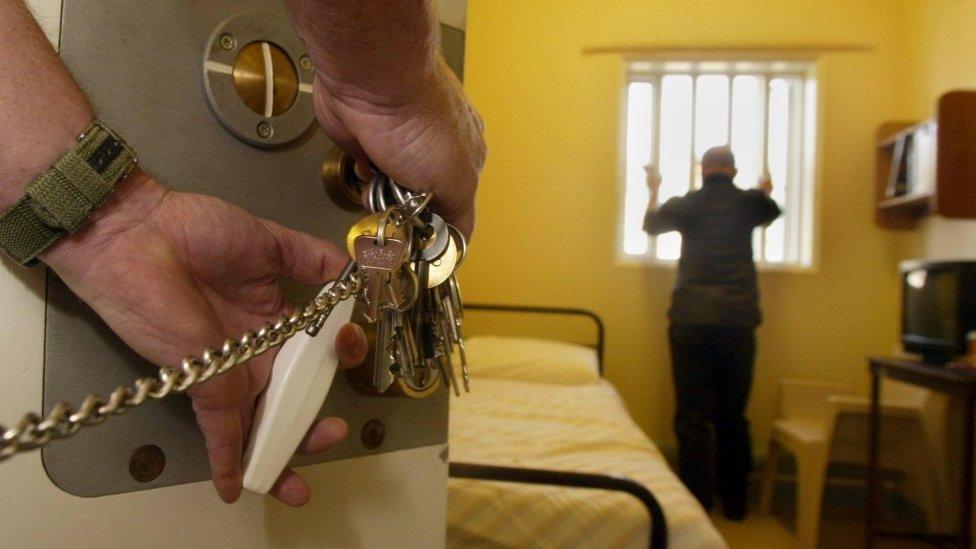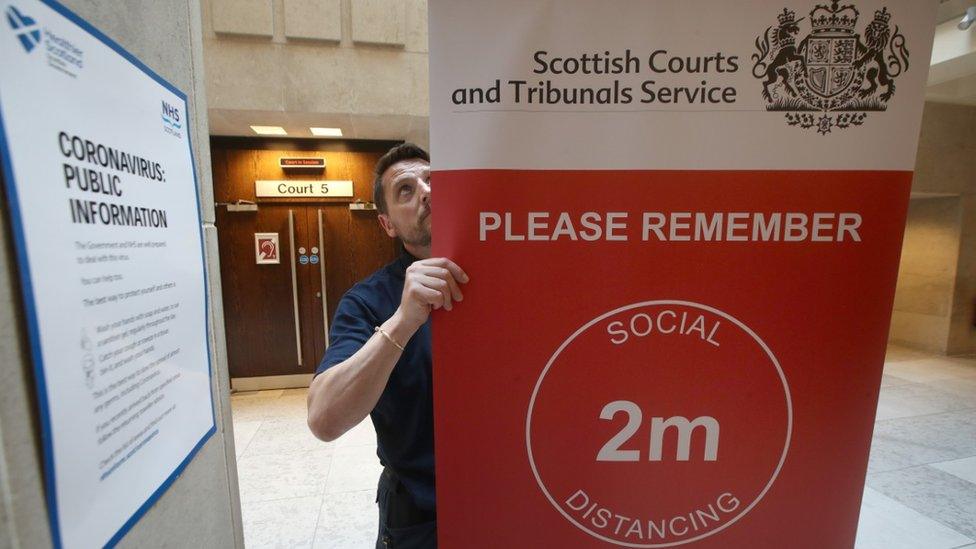Covid in Scotland: Quarter of prison population awaiting trial
- Published

Almost a quarter of Scotland's prison population is currently awaiting trial due to the Covid pandemic.
Remand prisoners say they are currently spending around 23 hours a day in their cells to stop the spread of the virus.
Senior lawyers and human rights activists are calling on ministers to set up a taskforce to review the cases and release 500 in a month.
The Scottish government said the safety and wellbeing of prisoners remained a priority.
One man, who was on remand for almost a year, told BBC Scotland: "With Covid restrictions you're locked up 23 hours a day so you're given 45/50 mins to come out in that time, somehow manage to phone your family, shower, sort food then whatever minutes are left is classed as exercise.
"That's you, day in day out."
He also said the pandemic has stripped away his support network.
"You weren't getting any visits due to Covid as well so I went nearly five months without seeing a single friend or family member," he said.
'Highly predictable'
He believes people in his position should be allowed to go home if, for example, they wear an electronic tag or observe a curfew.
Despite the presumption of innocence on remand, he feels he is being punished unfairly.
"In these conditions you are treated worse than someone who is guilty of the worst horrific crimes, you know, like murder," he said.
Untried prisoners normally make up around 20% of the prison population.
In April last year that percentage dipped to 13%, with 982 prisoners on remand.
But by 15 January the figure had increased to 1,808, almost 25% of the total.
Thomas Ross QC described the current situation as "highly predictable" as there were virtually no trials for four months.
The defence lawyer said: "The system works on the basis that people stay on remand for usually of a period of four or five months and then they have a trial and either they are acquitted and they leave the system completely, or they are convicted and the move into the convicted section of the prison estate.
"Obviously if that isn't happening and the court is maintaining the same policy in relation to bail then the remand numbers are just going to rise and rise and rise and that's exactly what we've seen."

The backlog of court cases has grown during lockdown
Mr Ross said everyone who is on remand is technically innocent but acknowledged courts may take the view that repeat offenders should not be allowed to stay in the community.
But he added: "I refuse to accept that there are 1,800 people in Scotland who are so dangerous that they cannot be released from prison under suitable conditions."
The QC added that as well as being in prison longer the conditions those on remand have to endure are "simply unacceptable".
He called on the government to appoint a taskforce to look at the problem with the aim of releasing 500 people in a month.
Mr Ross said: "If people were released on a condition they had to stay at their home address, their bail address for 23 hours a day they wouldn't really be much worse off than the rest of us at the moment."
'Inherent risk'
Last week the Scottish Human Rights Commission wrote to Justice Secretary Humza Yousaf to highlight its concerns.
The letter stated: "It is imperative that the Scottish prison population is reduced and does not rise above a level which mitigates the inherent risk of maintaining people in close confinement and spreading the virus in the prison estate and subsequently into the community.
"With a new strain of the virus that is reported to be up to 70% more infectious, the increased population within these confined spaces is all the more concerning. From our most recent discussions with HMIPS we know they too are extremely concerned about this issue."
A Scottish government said special measures were already in place to ensure prisons were safe and inmates maintained contact with their families.
A spokeswoman said: "The safety and wellbeing of all those in Scotland's prisons remains a priority and, thanks to the work of prison service and NHS staff, they have remained settings of low infection rates, with independent inspection reports showing prisons have remained safe and stable.
"A range of measures have been taken to mitigate the impact of restrictions, including mobile or in-cell phones and virtual visits in every prison to ensure important family contact is maintained.
"Clearly we take very seriously the current pressures facing the prison service, we remain vigilant and are actively considering what further action may be required to both reduce the use of imprisonment and maintain a lower prison population."
Last week the Scottish Courts Service said the majority of criminal trials were to be put on hold while the country is in lockdown.
Latest figures reveal that in April last year 18,024 trials were scheduled but by December that number had almost doubled to 34,283.
The further reduction of court activity due to the latest restrictions will increase the pressure, with an estimated backlog, as of last month, in excess of 40,000 cases.
Until the end of February only the "most serious" trials will proceed, to reduce the number of people needed to attend court during the pandemic.
Last September a Holyrood committee warned it could take a decade before things get back to normal.


Related topics
- Published11 January 2021

- Published28 September 2020
